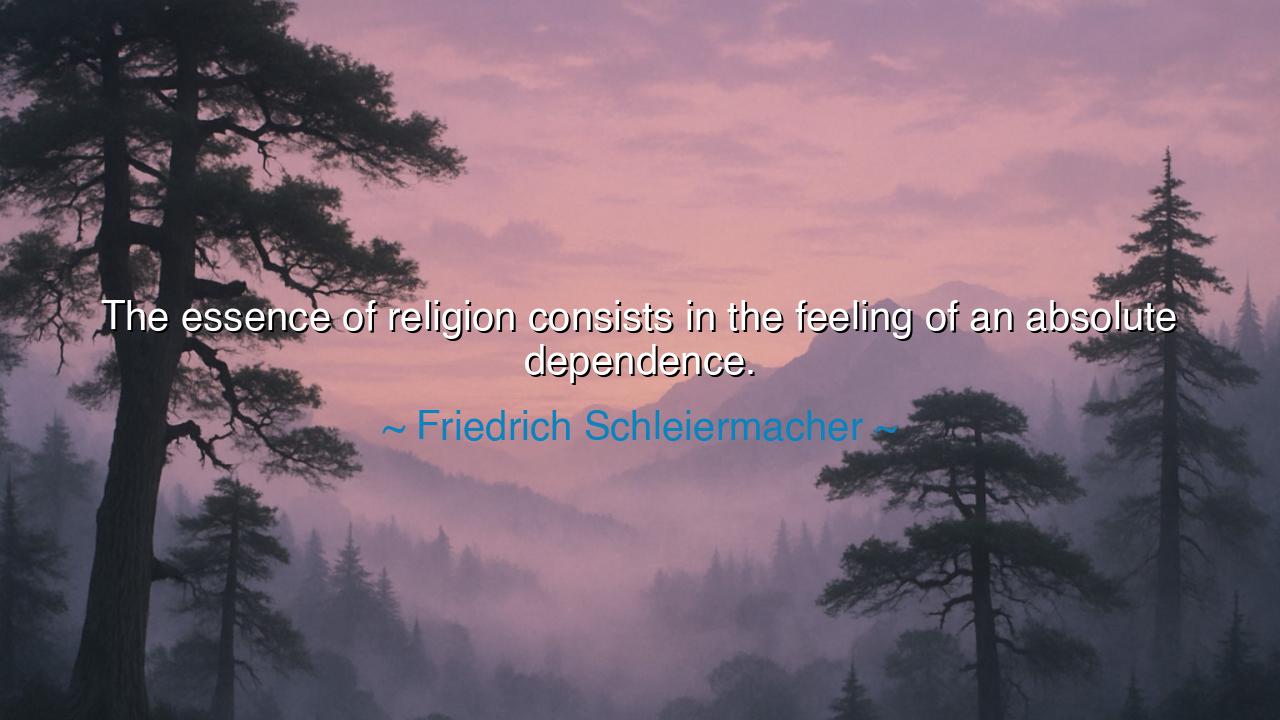
The essence of religion consists in the feeling of an absolute






“The essence of religion consists in the feeling of an absolute dependence.” Thus spoke Friedrich Schleiermacher, the philosopher who sought to draw the divine out of the cold walls of dogma and into the trembling heart of man. His words are not the rigid doctrines of a theologian, but the sigh of a soul that has glimpsed eternity. He does not speak of religion as a system, nor as a temple built by human hands, but as an experience—a feeling—that wells up from the depths of being, where the mortal recognizes his smallness before the Infinite. To feel absolute dependence is not to be enslaved, but to awaken; not to be humiliated, but to stand in awe before the mystery that sustains all things.
In this teaching lies a paradox that the proud mind resists. The modern heart, filled with its inventions and ambitions, cries, “I am the master of my fate, the captain of my soul.” Yet when the storm comes and the earth trembles beneath our feet, that illusion fades. The farmer who watches his harvest perish in drought, the mother who holds her dying child, the traveler lost in the desert—they all come to know this ancient truth: we are not self-sufficient beings. There is a power beyond us, not cruel, not capricious, but vast and unyielding, upon which our breath, our heartbeat, our very existence depend. It is in this realization that religion is born—not in fear, but in reverent wonder.
The great souls of old understood this feeling well. Think of Socrates, who, though wise among men, declared that he knew nothing except his ignorance before the divine. Or Job, stripped of everything he loved, yet still whispering, “Though He slay me, yet will I trust in Him.” These were not men broken by circumstance—they were men awakened. In their humility lay their strength. For when one feels absolute dependence, one no longer wrestles against fate; one moves with the current of the cosmos, trusting that the unseen hand that shapes the stars also shapes the heart.
There is a story told of a sailor in the age of great voyages. His ship was caught in a tempest that raged for days, the sky split by lightning, the ocean roaring like a beast. All his instruments failed him, his compass lost, his sails torn. In despair, he fell to his knees—not out of habit, but from an instinct deeper than reason. In that moment, he felt his smallness and the sea’s immensity; yet in that surrender, a strange peace entered his soul. He no longer prayed to be spared; he prayed only to belong—to the sea, to the storm, to the great mystery that held them both. When the morning came and the storm had passed, he wept—not because he was saved, but because he had, for the first time, felt the divine.
Schleiermacher’s vision was not one of ritual or law, but of relationship. To feel absolute dependence is to recognize that every breath you draw is a gift, every heartbeat a rhythm not your own. The proud man seeks control; the wise man seeks communion. This feeling is not weakness—it is alignment with reality. The oak tree depends on the rain and the sun, yet no one calls it weak; it grows strong because it knows how to receive. Likewise, the soul that surrenders to the divine does not become lesser—it becomes whole.
Do you wish to find the sacred? Then look not to the heavens first, but to your own trembling spirit. When you feel awe at the sunrise, gratitude in the midst of pain, or peace that comes without reason, you are tasting what Schleiermacher meant. Religion is not something one learns, but something one remembers—a whisper within that says, “You are held.” To feel absolute dependence is to rediscover that whisper and let it guide your days.
And what lesson, then, shall we carry? That life is not conquered by mastery but by surrender. To bow before the mystery of existence is not defeat—it is wisdom. The man who depends wholly upon himself is like a tree cut from its roots; it may stand for a while, but it cannot endure. The one who depends upon the Source, however unseen, becomes as the river that flows forever, nourished by the unseen springs of the mountain.
So live, then, with this truth in your heart: you are not alone, and you were never meant to be. Depend wholly, not in despair, but in trust. When you rise in the morning, give thanks for breath; when sorrow visits you, let it draw you nearer to the Eternal. Do not seek to command the universe—seek instead to commune with it. For in that feeling of absolute dependence, the heart is not diminished; it is set free. And in that freedom, the divine breathes through you, as it has through all who have ever loved, wept, and wondered at the mystery of being.






AAdministratorAdministrator
Welcome, honored guests. Please leave a comment, we will respond soon